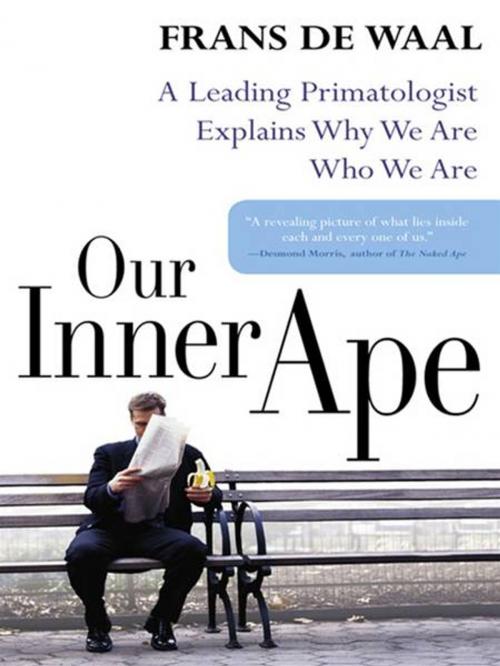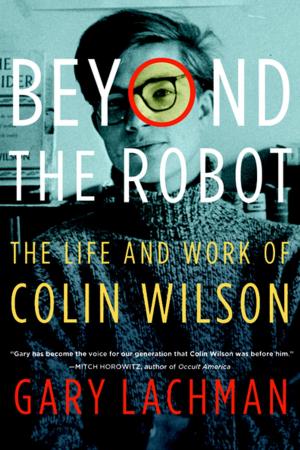Our Inner Ape
A Leading Primatologist Explains Why We Are Who We Are
Nonfiction, Health & Well Being, Medical, Nursing, Home & Community Care, Science & Nature, Science, Biological Sciences, Evolution, Social & Cultural Studies, Social Science, Anthropology| Author: | Frans de Waal | ISBN: | 9781101217382 |
| Publisher: | Penguin Publishing Group | Publication: | August 1, 2006 |
| Imprint: | Riverhead Books | Language: | English |
| Author: | Frans de Waal |
| ISBN: | 9781101217382 |
| Publisher: | Penguin Publishing Group |
| Publication: | August 1, 2006 |
| Imprint: | Riverhead Books |
| Language: | English |
Visit the author's Web site at www.ourinnerape.com
It’s no secret that humans and apes share a host of traits, from the tribal communities we form to our irrepressible curiosity. We have a common ancestor, scientists tell us, so it’s natural that we act alike. But not all of these parallels are so appealing: the chimpanzee, for example, can be as vicious and manipulative as any human.
Yet there’s more to our shared primate heritage than just our violent streak. In Our Inner Ape, Frans de Waal, one of the world’s great primatologists and a renowned expert on social behavior in apes, presents the provocative idea that our noblest qualities-generosity, kindness, altruism-are as much a part of our nature as are our baser instincts. After all, we share them with another primate: the lesser-known bonobo. As genetically similar to man as the chimpanzee, the bonobo has a temperament and a lifestyle vastly different from those of its genetic cousin. Where chimps are aggressive, territorial, and hierarchical, bonobos are gentle, loving, and erotic (sex for bonobos is as much about pleasure and social bonding as it is about reproduction).
While the parallels between chimp brutality and human brutality are easy to see, de Waal suggests that the conciliatory bonobo is just as legitimate a model to study when we explore our primate heritage. He even connects humanity’s desire for fairness and its morality with primate behavior, offering a view of society that contrasts markedly with the caricature people have of Darwinian evolution. It’s plain that our finest qualities run deeper in our DNA than experts have previously thought.
Frans de Waal has spent the last two decades studying our closest primate relations, and his observations of each species in Our Inner Ape encompass the spectrum of human behavior. This is an audacious book, an engrossing discourse that proposes thought-provoking and sometimes shocking connections among chimps, bonobos, and those most paradoxical of apes, human beings.
Visit the author's Web site at www.ourinnerape.com
It’s no secret that humans and apes share a host of traits, from the tribal communities we form to our irrepressible curiosity. We have a common ancestor, scientists tell us, so it’s natural that we act alike. But not all of these parallels are so appealing: the chimpanzee, for example, can be as vicious and manipulative as any human.
Yet there’s more to our shared primate heritage than just our violent streak. In Our Inner Ape, Frans de Waal, one of the world’s great primatologists and a renowned expert on social behavior in apes, presents the provocative idea that our noblest qualities-generosity, kindness, altruism-are as much a part of our nature as are our baser instincts. After all, we share them with another primate: the lesser-known bonobo. As genetically similar to man as the chimpanzee, the bonobo has a temperament and a lifestyle vastly different from those of its genetic cousin. Where chimps are aggressive, territorial, and hierarchical, bonobos are gentle, loving, and erotic (sex for bonobos is as much about pleasure and social bonding as it is about reproduction).
While the parallels between chimp brutality and human brutality are easy to see, de Waal suggests that the conciliatory bonobo is just as legitimate a model to study when we explore our primate heritage. He even connects humanity’s desire for fairness and its morality with primate behavior, offering a view of society that contrasts markedly with the caricature people have of Darwinian evolution. It’s plain that our finest qualities run deeper in our DNA than experts have previously thought.
Frans de Waal has spent the last two decades studying our closest primate relations, and his observations of each species in Our Inner Ape encompass the spectrum of human behavior. This is an audacious book, an engrossing discourse that proposes thought-provoking and sometimes shocking connections among chimps, bonobos, and those most paradoxical of apes, human beings.















